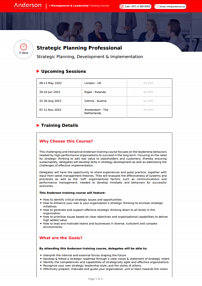- Course Finder
- Formats
- Training Topics
- Business Strategy
- Management & Leadership
- Personal Development Skills
- Innovation & Creativity
- Emotional Intelligence
- Governance and Compliance
- Business & Life Synergy
- Business Agility
- Business Sustainability
- Executive & Administrative Support
- Customer Service
- Sales & Marketing
- Human Resource HR Management
- Finance & Budgeting
- Data Science and Protection
- Project Management
- CertNexus
- Special Courses
- 10 Day Seminars
- The Essential Skills
- The Advanced Skills
- The Mini MBA Series
- Bootcamps
- Training Venues
-
- Certificates
- Calendars
- About us
- الدورات العربية
We currently have no scheduled session for this Training Course. If you are interested in running this course, please contact our Training Department at info@anderson.ae
Training Course Overview
Growing levels of scrutiny on leaders, from outside their organizations and within, have made leadership more challenging than ever. This new and dynamic course examines the crucial survival factors and techniques that the modern Leader can and must deploy. Social Media means that “everyone” can potentially become an angry journalist. The evidence indicates that global leaders and their organizations are being targeted as never before. Deserved or not, the attacks can be ugly, personal, unfair, and unrelenting. Attendance on this course will provide leaders with answers and solutions.
Training Course Objectives
By attending this Anderson training course, delegates will be able to:
- Implement an effective reputation management strategy
- Identify ten ways for Leaders to deal with angry stakeholders
- Understand the fourteen characteristics of an effective Crisis Leader
- Develop the ten steps the Board should take Before, During and After Crisis
- Understand why good managers sometimes make poor Crisis Leaders
- Understand how to remedy any Social Media gap in Crisis Communications
- Analyse incoming crisis information and deliver a successful press briefing
- Understand the five deadly Leadership behaviours & the six winning strategies
Designed For
This Anderson training course is suitable to a wide range of professionals but will greatly benefit:
- Leaders, Managers or Team Leaders involved in crisis decision making
- Public Relations professionals
- Crisis Management Team members
- Emergency Response professionals
- HSSE Professionals
Day One: Diagnosis of the Issue, Know the Difference Between a Problem, a Crisis and an Attack
- How to prepare for something that you do not know is going to happen?
- Alternative facts and fake news implications
- Consider the difference between Crisis Management & Issues Management
- How to survive the attack - What type of response is required?
- The demands of Social Media on the Organization
- Recent Case Studies
Day Two: Effective Team:3 C´s Co-operation, Co-ordination & Communication
- Rapid Team building when the problem arrives
- Ultimate goal of the team, is situation awareness
- Leadership delegation to the Team
- Six Social Media musts for crisis communications within the team
- Six P´s of Team Crisis Management
Day Three: Damage Control Means more than just having to Say Sorry
- What to do when you or your company has clearly done something wrong
- How to know if a mistake has been made?
- How to explain your actions and make amends?
- Have you caused harm with a deviation from corporate policies?
- How to avoid battles - Ten ways to avoid conflict
- In a Crisis situation does personality “Trump” planning
Day Four: The Transition from Line Management to Crisis Management. Decision Making – Solving the Problem
- Listen and Learn, and Learn to Look and Listen more
- Decision making psychology as an individual and collectively
- Fighting for and controlling crisis information with Courage and Determination
- Nine habits that lead to terrible decisions
- Controlling and delivering on perceptions
- Examination of Leadership applications in Past Crises: Successes & Failures
Day Five: Managing the Media - “No Comment” means “We are Guilty”!
- How to run a difficult Press Conference
- Essential guidelines and checklists for TV Interviews
- Implementing a Reputation Management Strategy
- Case Studies - Those who survived, how did they achieve that?
- Crisis Communications Exercise – Press conference to a given scenario
- Anderson Certificate of Completion will be provided to delegates who attend and complete the course
Training Course Overview
Growing levels of scrutiny on leaders, from outside their organizations and within, have made leadership more challenging than ever. This new and dynamic course examines the crucial survival factors and techniques that the modern Leader can and must deploy. Social Media means that “everyone” can potentially become an angry journalist. The evidence indicates that global leaders and their organizations are being targeted as never before. Deserved or not, the attacks can be ugly, personal, unfair, and unrelenting. Attendance on this course will provide leaders with answers and solutions.
Training Course Objectives
By attending this Anderson training course, delegates will be able to:
- Implement an effective reputation management strategy
- Identify ten ways for Leaders to deal with angry stakeholders
- Understand the fourteen characteristics of an effective Crisis Leader
- Develop the ten steps the Board should take Before, During and After Crisis
- Understand why good managers sometimes make poor Crisis Leaders
- Understand how to remedy any Social Media gap in Crisis Communications
- Analyse incoming crisis information and deliver a successful press briefing
- Understand the five deadly Leadership behaviours & the six winning strategies
Designed For
This Anderson training course is suitable to a wide range of professionals but will greatly benefit:
- Leaders, Managers or Team Leaders involved in crisis decision making
- Public Relations professionals
- Crisis Management Team members
- Emergency Response professionals
- HSSE Professionals
Day One: Diagnosis of the Issue, Know the Difference Between a Problem, a Crisis and an Attack
- How to prepare for something that you do not know is going to happen?
- Alternative facts and fake news implications
- Consider the difference between Crisis Management & Issues Management
- How to survive the attack - What type of response is required?
- The demands of Social Media on the Organization
- Recent Case Studies
Day Two: Effective Team:3 C´s Co-operation, Co-ordination & Communication
- Rapid Team building when the problem arrives
- Ultimate goal of the team, is situation awareness
- Leadership delegation to the Team
- Six Social Media musts for crisis communications within the team
- Six P´s of Team Crisis Management
Day Three: Damage Control Means more than just having to Say Sorry
- What to do when you or your company has clearly done something wrong
- How to know if a mistake has been made?
- How to explain your actions and make amends?
- Have you caused harm with a deviation from corporate policies?
- How to avoid battles - Ten ways to avoid conflict
- In a Crisis situation does personality “Trump” planning
Day Four: The Transition from Line Management to Crisis Management. Decision Making – Solving the Problem
- Listen and Learn, and Learn to Look and Listen more
- Decision making psychology as an individual and collectively
- Fighting for and controlling crisis information with Courage and Determination
- Nine habits that lead to terrible decisions
- Controlling and delivering on perceptions
- Examination of Leadership applications in Past Crises: Successes & Failures
Day Five: Managing the Media - “No Comment” means “We are Guilty”!
- How to run a difficult Press Conference
- Essential guidelines and checklists for TV Interviews
- Implementing a Reputation Management Strategy
- Case Studies - Those who survived, how did they achieve that?
- Crisis Communications Exercise – Press conference to a given scenario
The Certificate
-
Anderson Certificate of Completion will be provided to delegates who attend and complete the course
Info & In-house Solution
For more information about this course, call or email us at:
Call us: +971 4 365 8363



